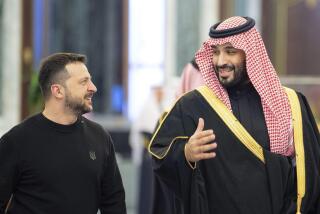Arab Leaders Endorse Albright’s Approach to Peace
- Share via
JIDDA, Saudi Arabia — Leaders of Egypt and Saudi Arabia endorsed Secretary of State Madeleine Albright’s approach to the Israeli-Palestinian peace process Saturday, despite a drumbeat of criticism directed toward her by the government-influenced media in both countries.
Saudi Crown Prince Abdullah, long considered the least pro-American of the kingdom’s senior princes, described Albright as “brave and frank,” and Egyptian President Hosni Mubarak said the secretary of State had made more headway toward refurbishing Israeli-Palestinian relations than she had acknowledged.
“This is what we always look for in an [American] administration--a secretary of State who is brave and frank at the same time,” Abdullah said for the benefit of reporters called to watch the start of his meeting with Albright. “You and I have a lot in common--we both like to be frank and honest, straightforward. We don’t like to beat around the bush.”
U.S. officials were ecstatic about the comments from the dour crown prince, a half-brother of King Fahd. Abdullah has assumed increasing governmental responsibilities from the ailing monarch.
“We had been trying to cultivate and broaden our relations with this guy,” a senior U.S. official said of Abdullah. “Frankly, it’s been an area where we haven’t done the job very well. I am extremely happy with the way today went.”
Albright flew to the Red Sea port city of Jidda following a morning of talks with Mubarak in Alexandria, Egypt.
The visit to Saudi Arabia, a conservative Muslim nation where women rarely play a role in public politics, was an interesting test for Albright, the first woman secretary of State. In deference to the kingdom’s religious sensitivities, she wore a long black dress with long sleeves, but her Saudi hosts made it clear that her gender was no impediment to their working with Washington’s chief diplomat.
According to U.S. officials who attended the meetings in both Egypt and Saudi Arabia, the Arab leaders hailed Albright’s approach of pushing both Israelis and Palestinians to shoulder their “mutual responsibilities” in revitalizing the peace process.
Mubarak, Fahd and Abdullah all told Albright that her talks last week in Israel and the West Bank produced more movement than she claimed. On Friday, Albright said she had made only “small steps” when more far-reaching action was required.
With Albright at his side, Mubarak told a news conference: “What she has done and achieved was not expected by other people. . . . It is encouraging; it is giving hope.”
Although they made no similar comments in public, the Saudi leaders also endorsed Albright’s approach and urged her not to minimize her accomplishments, although they heaped heavy criticism on Israeli Prime Minister Benjamin Netanyahu, the U.S. officials said.
The comments from Saudi and Egyptian leaders contrasted sharply with the caustic response of the government-influenced media in both countries.
In an editorial Saturday, the Saudi Gazette said: “The lady is sadly mistaken if she thinks that her position--so attuned to the demands of Benjamin Netanyahu--will contribute to bringing about peace in the Middle East.”
Egyptian state media, reporting on the Alexandria visit, were generally critical of Albright and cynical about the impact of her trip.
One television report Saturday began by saying that Albright had been silent for a long time (a reference to her delay after taking her position in January before making her first mission to the Middle East), but when she finally spoke, she had said the wrong thing.
A column in the semiofficial daily Al Ahram said: “Albright’s sympathy toward Israel is understandable. She did not hide it or deny it. She even illustrated it by visiting the victims of . . . explosions in Jerusalem, at the same time as she forgot hundreds, even thousands, of victims who have fallen because of the bullets of Israeli coercion and terrorism which continues in the West Bank, Jerusalem and South Lebanon.”
More to Read
Sign up for Essential California
The most important California stories and recommendations in your inbox every morning.
You may occasionally receive promotional content from the Los Angeles Times.













